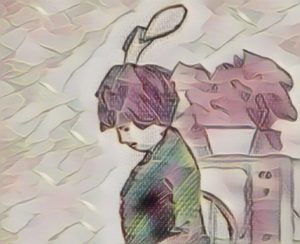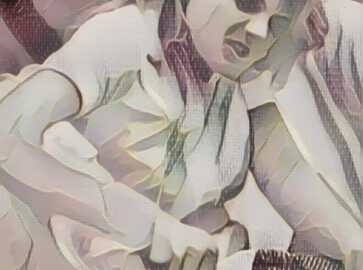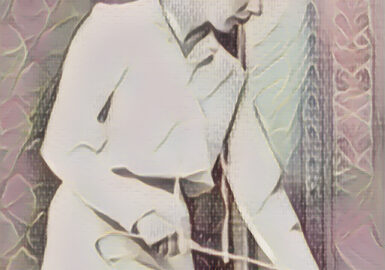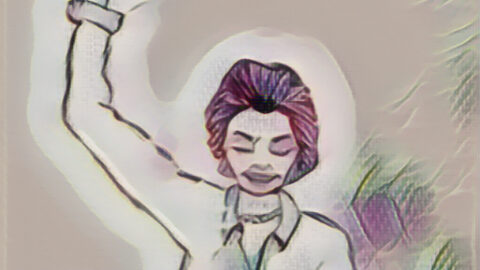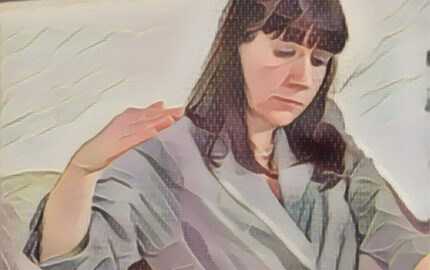(gap: 2s) Before I share with you the delightful adventures of our Sunday mornings, let me introduce the dear friends who made my childhood so very special. There was Michael, who was rather tall for his age, with a mop of untidy brown hair that always seemed to fall into his eyes, and a smile that could charm even the sternest teacher. He was our leader, brave and full of ideas, always the first to try something new and the last to give up, his laughter ringing out above all others. Then there was Linda, small and dainty, with large blue eyes and a ribbon that never stayed straight in her fine blonde hair. She was gentle and thoughtful, her cheeks often marked with a spot of jam, and she was the best at finding hiding places, though she would squeak if startled. The Carter twins, David and Carol, were always together—David, quick and wiry, with sandy hair and a love of competition, and Carol, who looked just like him but was far more dramatic, with a laugh that filled the room. And then there was Susan, who was something of a legend among us: tall and confident, with a cascade of dark curls, sharp brown eyes that missed nothing, and a self-assurance that made us all look up to her. She had begun to wear a proper blouse and sometimes even a touch of lipstick, bright as a badge, and she had a way of leading that none of us could resist.
In our little town, Sunday mornings always began with the ringing of the church bell, its gentle chime floating down the quiet streets and waking even the sleepiest of us. The air was filled with the scent of coal fires and the promise of Sunday roast, but for us children, the true adventure began after the hymns had ended and the grown-ups settled into their long, winding conversations.
(short pause) My friends and I—Michael, with his untidy brown hair and charming smile; Linda, always with a crooked ribbon in her hair and a dab of jam on her cheek; and the Carter twins, David and Carol, who were never apart and always up to something—would gather beneath the old yew tree in the churchyard. We played all the favourite games: tag, hide and seek, leapfrog over the gravestones, football with a battered ball, and kick-the-can with a dented tin. But my favourite, the one that made my heart beat with excitement, was a game we called Smacky Bottoms.
(pause) Smacky Bottoms was a game that belonged to the secret world of our childhood, a special ritual for the bravest among us. We never played it where adults could see. Instead, we would slip away to the abandoned house at the edge of town—a crumbling old place from before the war, its windows empty, its walls covered in ivy, and the air inside thick with dust and the scent of old wood. The floorboards creaked beneath our feet, and the only light came in slanting beams through holes in the roof, making everything feel both magical and a little bit forbidden.
(short pause) The excitement was almost too much to bear. As we crept through the overgrown garden and tiptoed inside, our giggles echoing off the peeling walls, you could feel the tension growing. The rules were simple: everyone except one would lie face down on the cold stone slab in the front room, while the chosen ‘smacker’ would give each a firm slap. Then the smacker would join the line, and the next would take their turn, until we were all red-faced and breathless with laughter and pride.
(pause) The moment before the first smack was always the most nerve-wracking—lying there, cheek pressed to the cold stone, heart thumping so loudly you thought everyone could hear it. The air was full of nervous giggles and the shuffling of feet. You could hear the smacker’s footsteps coming closer, slow and careful, the sound of their palm smacking into their own hand as they prepared. Every sense was sharper: the musty smell of the house, the roughness of the stone beneath your skin, the cool air on your skin, and the chorus of muffled laughter and whispered dares.
(short pause) Each child reacted differently. Michael, always the brave one, would grit his teeth and try not to flinch, but his eyes would grow wide at the sting, and he would let out a yelp that made everyone laugh. Linda, gentle and shy, would squeeze her eyes shut and whimper, her face turning redder than her bottom, and sometimes she would jump up with tears in her eyes, promising never to play again. The Carter twins, always competing, would try to outdo each other—David would bite his lip and refuse to make a sound, while Carol would let out a dramatic howl, then grin as if she had won a prize. And then there was Susan.
(pause) Susan was a legend to us—tall for her age, with a mop of dark curls and a look that made you feel both special and a little nervous. She had begun to wear a proper blouse, and sometimes she would arrive with a streak of lipstick, borrowed from her mother, bright as a badge on her cheek. That day, as we lined up on the slab, Susan waited at the back, her eyes sparkling with mischief. She strolled over, placing her hand on David Carter’s back, who yelped and tried to wriggle away. “Let us make it a real challenge,” she announced, her voice full of authority. “Let us see who can bear the hardest smack.” Before anyone could object, she told us to get ready, and there we were, a row of friends, hearts thumping with a mixture of dread and excitement.
(short pause) The atmosphere in the house was thick with excitement and embarrassment, the kind that only comes from doing something you know is a little bit naughty. The sound of Susan’s hand meeting skin was sharp and echoing, followed by a chorus of gasps, squeals, and laughter that bounced off the crumbling walls. The sting was immediate—a hot, tingling feeling that made you jolt against the cold stone, but there was a strange pride in taking it without a sound, in showing you were brave enough to bear it. Susan did not stop at one round; she marched up and down the line, delivering fresh smacks, her laughter ringing out as we squirmed and squealed. Each smack left a handprint, a badge of honour that we would compare afterwards, giggling and boasting about who had taken the hardest hit.
(pause) The embarrassment was real—lying there, exposed, with your friends watching and waiting their turn—but so was the thrill. There was a wildness to it, a sense that we were defying the world of adults and their endless rules, making a place that was ours alone. The laughter was loud and free, echoing through the empty rooms, mingling with the creaks and groans of the old house. Even Linda, after her tears, would sometimes peek back in, drawn by the sound of our fun, unable to resist joining us again.
(short pause) When it was my turn, I pressed my face to the stone, bracing myself. The anticipation was almost worse than the smack itself—every second seemed to last forever, every sound was louder. When Susan’s hand finally landed, the sting shot through me, sharp and hot, but I bit my lip and refused to cry out. There was a strange satisfaction in it, a pride that lingered long after the redness faded. We would all compare our marks, laughing and teasing, but underneath it all was a bond—a sense that we had shared something secret and wild, something that belonged only to us.
(pause) Looking back, I see how much those afternoons shaped us. There was a bond in our mischief, a sense that we were all in it together, no matter what. We learned about pain and pride, about daring and loyalty, and about the mysterious line between childhood and something a little more grown-up. The abandoned house, with its dust and shadows, became a place of laughter and courage, a stage for our bravest selves.
(short pause) Years later, when I was old enough to walk Susan home from the cinema, I finally found the courage to ask her if she would like to be my sweetheart. She laughed—a sound as bright and clear as ever—and shook her head. “You are very kind,” she said, “but you are not quite bold enough for me.” Then, with a mischievous smile, she added, “But if you ever wish for another game of Smacky Bottoms, you know where to find me.”
(pause) Even now, when I hear the church bell on a Sunday morning, I remember those days—the games, the laughter, the sting of Susan’s hand, the echo of our voices in the old house—and I smile, grateful for the wild, magical days of childhood, and the secret pride that comes from daring to play.



